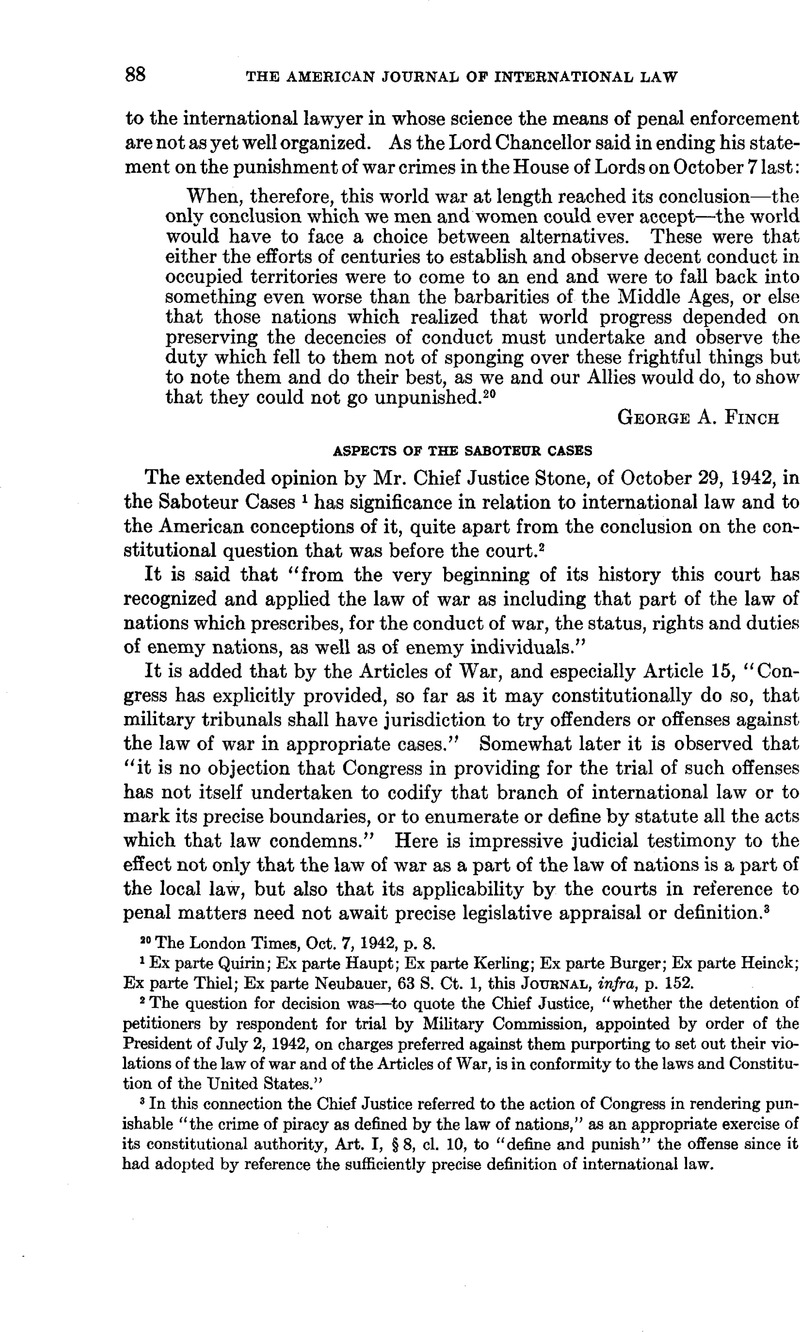Published online by Cambridge University Press: 12 April 2017

1 Ex parte Quirin; Ex parte Haupt; Ex parte Kerling; Ex parte Burger; Ex parte Heinck; Ex parte Thiel; Ex parte Neubauer, 63 S. Ct. 1, this Journal, infra, p. 152.
2 The question for decision was—to quote the Chief Justice, “whether the detention of petitioners by respondent for trial by Military Commission, appointed by order of the President of July 2, 1942, on charges preferred against them purporting to set out their violations of the law of war and of the Articles of War, is in conformity to the laws and Constitution of the United States.”
3 In this connection the Chief Justice referred to the action of Congress in rendering punishable “the crime of piracy as defined by the law of nations,” as an appropriate exercise of its constitutional authority, Art. I, §8, cl. 10, to “define and punish” the offense since it had adopted by reference the sufficiently precise definition of international law.
4 Malloy’s Treaties, II, 2286.
5 Id., where it is added: “Thus, soldiers not wearing a disguise who have penetrated into the zone of operations of the hostile army, for the purpose of obtaining information, are not considered spies. Similarly, the following are not considered spies: Soldiers and civilians, carrying out their mission openly, intrusted with the delivery of despatches intended either for their own army or for the enemy’s army. To this class belong likewise persons sent in balloons for the purpose of carrying despatches and, generally, of maintaining communications between the different parts of an army or a territory.”
6 No. 204, 1934 edition, and No. 203, 1940 edition. See also Lauterpacht’s 6th ed. of Oppenheim, II, § 159.
7 Declares Winthrop: “The employment of spies is not infrequently resorted to by military commanders, and is sanctioned by the usages of civilized warfare.” Military Law, 2d ed., 1920, Sec. 1200. Yet that writer also observes: “A spy under capture, is not treated as a prisoner of war but as an outlaw, and is to be tried and punished as such.” (Id., Sec. 1197.) He adds: “By the law of nations the crime of a spy is punishable with death.” (Id., Sec. 1199.)
8 After noting that the definition of lawful belligerents in paragraph 9 of the Army Rules of Land Warfare is that adopted by Article I of the Annex to Hague Convention No. IV of October 18, 1907, to which the United States became a party, and after quoting the preamble to that convention, the court declared: “Our Government, by thus defining lawful belligerents entitled to be treated as prisoners of war, has recognized that there is a class of unlawful belligerents not entitled to that privilege, including those who though combatants do not wear ‘fixed and distinctive emblems.’ And by Article 15 of the Articles of War Congress has made provision for their trial and punishment by military commission, according to the ‘law of war.’”
9 Because of this circumstance it may be asked how it is possible to reconcile statements which acknowledge the propriety of State conduct or practice in employing spies with the conclusion that the act of a spy is violative of the law of war and hence internationally illegal. It may not be possible to do so in point of logic. It seems indeed grotesque for a State to say to its soldier: “We authorize and want you to do a thing which the law of war forbids and which, if you violate its prohibition, will subject you, if captured, to summary treatment.” Yet this is just what in fact happens; and because it happens there may be reason to modify the law of war and regard the spy as in no worse a light than the State which urges and authorizes him to become one for the sake of its own public cause.
10 In the course of his illuminating article on “Contraband of War” published by the American Philosophical Society in 1912, he trenchantly declared: “Merchandise is not confiscated, voyages are not broken up, ships are not condemned, for acts that are innocent; these severe and destructive inflictions are penalties imposed for acts that are unlawful…. Obviously the determination of the question whether an act is lawful or unlawful depends not upon the circumstance that the right or duty to punish it is committed to one agency or another, but upon the fact that it is or is not punishable. The proof that it is unlawful is found in the fact that its commission is penalized. All acts for the commission of which international law prescribes a penalty are in the sense of that law unlawful.”